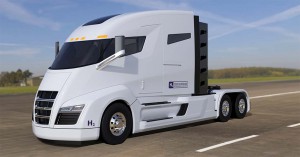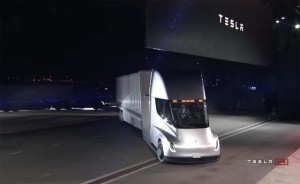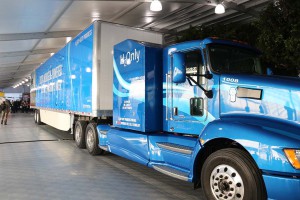There’s something ironic about learning that Nikola is suing Tesla, two companies both meant to honor maverick inventor Nikola Tesla, but the Salt Lake City-based Nikola Motor Co. has filed a suit against Silicon Valley rival claiming Tesla has infringed on its design patents.
While Tesla is best known for its battery sedan and SUV models, it is also hoping to become a big player in the truck market with the upcoming launch of its electric Semi. Nikola, meanwhile, also wants to turn the truck industry green, though it is focusing on the hydrogen fuel-cell technology that will power rigs like its heavy-duty Nikola One. And it claims the similarities in the look of the two trucks is more than coincidental.
“The Tesla Semi design is substantially similar to Nikola’s unique design, and Tesla copied Nikola’s patents,” the start-up claims in a lawsuit filed on Tuesday. It added that it “estimates its harm from Tesla’s infringement to be in excess of $2 billion.”
For its part, Tesla issued a reply to the Nikola allegations asserting that, “It’s patently obvious there is no merit to this lawsuit.”
Nikola was known to be working on a hydrogen fuel-cell-powered semi-truck for several years before officially unveiling the Nikola One at a ceremony in its headquarters town of Salt Lake City in December 2016.
“There are many out there that wondered if we would deliver, but today we proudly show off the most advanced semi-truck ever built,” Nikola founder and CEO Trevor Milton, declared during the well-attended debut.
Nikola has promised that the rig will be able to deliver the equivalent of 15 to 20 miles per gallon running on hydrogen – as much as twice what diesel trucks get — and travel as much as 1,000 miles between fill-ups – which could be accomplished in about the same time it now takes to fill up a diesel. Meanwhile, it also promised to set up a network of hydrogen stations across the U.S. to address the chicken-and-egg problem of not currently having a hydrogen distribution infrastructure.
In January of this year, Nikola announced plans to build a 1 million square-foot plant in Phoenix to produce both the Nikola One and smaller Nikola Two models, with the facility expected to be completed in 2024. It intends to use another facility to launch production of the trucks in 2019 and claims to already have 8,000 pre-orders in hand – backed by $6.3 billion in deposits.
(Nikola heads for Phoenix with hydrogen truck. Click Here for the story.)
As for Tesla, founder and CEO Elon Musk has frequently shown disdain for hydrogen technology, dubbing it “fool-cells.” He intends to power the Tesla Semi with scaled up versions of the batteries used in products like the current Models S, X and 3.
A prototype version of the Semi was revealed during Tesla’s own, splashy event last November, Musk teasing the event by promising attendees should prepare to have their minds blown “clear out of your skull and into an alternate dimension.”
(Does Tesla Semi live up to the hype? Click Here for more.)
The truck will get up to 500 miles per charge, deliver near sports car acceleration and “not break down for 1 million miles,” he promised during the event, advantages that quickly saw companies like UPS and PepsiCo express interest in integrating the Tesla Semi into their fleets.
But while the Nikola and Tesla trucks will rely on radically different green powertrain systems, the Salt Lake City company says there are some uncomfortable – and allegedly illegal – similarities elsewhere. It points to details including its wrap-around windshield, mid-entry door, and other design elements that are covered by six patents issued by the U.S. Patent and Trademark Office this year.
Nikola said it attempted to communicate with Tesla days before the California company unveiled the Semi, asking that the debut event be canceled. Tesla, according to the new lawsuit, never responded.
What will happen now is uncertain, but it’s just the latest in a series of headaches for Tesla which later today is expected to announce that its losses more than doubled during the first quarter of 2018, largely due to ongoing delays in the production ramp-up of the Model 3 battery-sedan.
(Click Here for details about Toyota’s own plans for a hydrogen semi truck.)



